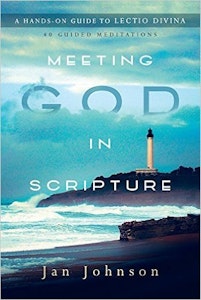 Excerpt from Meeting God in Scripture
Excerpt from Meeting God in Scripture
Meditation on Scripture was a common activity in Jewish culture. It is mentioned fifteen times just in the Psalms. Those who meditated on the law day and night flourished like trees planted by streams of water. Meditating on Scripture gave the psalmists wisdom that surpassed their teachers and enemies, led to diligent obedience and kept them out of temptation’s way. Meditation was a delightful practice—God’s words tasted sweeter than honey (Psalm 7:7-3; 119:97 – 103).
Scripture meditation has been so neglected in the last century that some have come to associate meditation only with Eastern religions. But the fact that meditation is common in Eastern religions doesn’t mean it is wrong. Eastern religions practice other disciplines Christians practice, such as fasting, praying and even repeating quotations from Jesus. Perhaps Scripture meditation became infrequent because of the post- Enlightenment emphasis on science and linear thinking, which displaced reflection and rest (two ideas found prominently in the Psalms).
Like all spiritual disciplines, Scripture meditation is another way to become more attentive to the still, small voice of God and to become more willing to respond when we hear it. Paired with the study of Scripture, meditation helps both those who are new to faith and those who feel like they’ve heard it all before. Even if you’re familiar with the words and ideas, in Scripture meditation God speaks the words we need to hear in our life today. Because meditating on Scripture helps us hear God’s Word to us, we experience even well-known passages in fresh ways.
Excerpted from Meeting God in Scripture: A Hands-On Guide to Lectio Divina by Jan Johnson, published in 2016 by Intervarsity Press (Downer’s Grove, IL).


